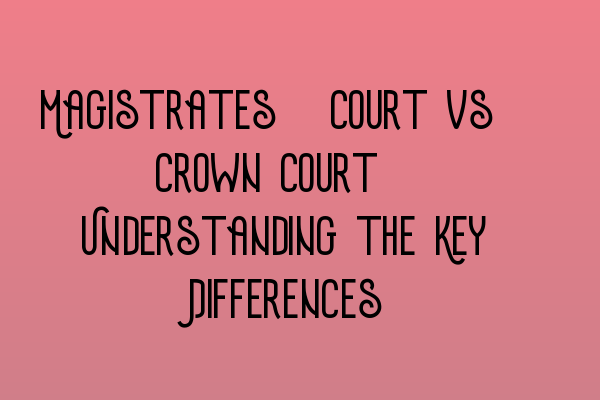Magistrates’ Court vs. Crown Court: Understanding the Key Differences
Welcome to the SQE Criminal Law & Practice Law UK blog! In this post, we will explore the key differences between Magistrates’ Court and Crown Court in the UK criminal justice system. Whether you are a law student, aspiring solicitor, or preparing for the SQE Criminal Practice exam, it is essential to understand these distinctions.
Overview
Magistrates’ Court and Crown Court are two different tiers of courts in the UK. Magistrates’ Court is the lower court that deals with less serious criminal cases, while Crown Court is the higher court where more serious cases are heard. The division between the two courts is crucial in determining the legal procedures, sentencing powers, and the types of cases they handle.
Key Differences
1. Jurisdiction
Magistrates’ Court has limited jurisdiction and can typically hear summary offenses like minor assaults, theft, and driving offenses. On the other hand, Crown Court has broader jurisdiction and handles serious offenses such as murder, rape, and drug trafficking.
If you want to expand your expertise in criminal practice, consider attending our Workshops and Seminars on Criminal Practice: Expanding Your Expertise.
2. Legal Process
At Magistrates’ Court, cases are usually heard by a panel of three magistrates or a district judge. Crown Court, on the other hand, has a jury of 12 members and a judge presiding over the proceedings. The involvement of a jury and a higher-ranking judge makes the process more formal and complex in Crown Court.
3. Sentencing Powers
Magistrates’ Court has limited sentencing powers and can impose shorter prison sentences (up to a maximum of 6 months) and fines. Crown Court, being the higher court, can impose longer prison sentences and higher fines to reflect the severity of the crimes committed.
4. Appeals Process
If a defendant is dissatisfied with the decision made at Magistrates’ Court, they can appeal to the Crown Court for a re-trial or reconsideration of the sentence. Appeals from Crown Court are typically heard by the Court of Appeal.
Stay Prepared and Informed
To conquer the SQE Criminal Law exam and master the multiple-choice questions, make sure to check out our article on Mastering MCQ Strategies for SQE Criminal Law: Conquer the Exam.
It is essential for legal professionals to stay informed about the latest updates in UK criminal laws. Stay up-to-date with the changes and developments in the field by reading our article on Updates in UK Criminal Laws: Staying Informed and Prepared.
Conclusion
Understanding the key differences between Magistrates’ Court and Crown Court is vital for anyone involved in criminal law practice. While Magistrates’ Court handles less serious cases with limited sentencing powers, Crown Court deals with serious offenses and has greater jurisdiction and sentencing powers.
For a simulated exam experience and to enhance your preparation for the SQE Criminal Practice exam, we recommend taking our Mock Tests for SQE Criminal Practice: Exam Simulation for Success.
We hope this article provided you with a clear understanding of the differences between Magistrates’ Court and Crown Court. If you have any questions or need further information, please don’t hesitate to contact SQE Criminal Law & Practice Law UK.
